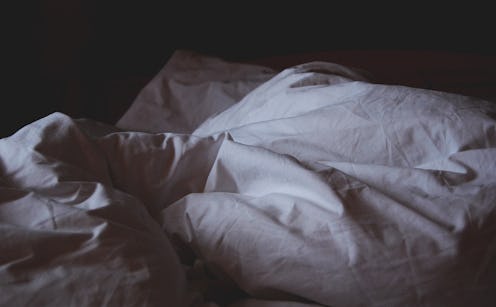Life
6 Ways Sleep Can Affect Your Health

When it comes to sleep and how important it is, most of us only think about our energy level. However, how much you slumber can have a much greater impact than just how rested you feel. There are a number of surprising ways in which sleep can affect your health. Just as exercising and eating well can influence how you feel, so too can the amount of sleep you get. Which means fitting in some adequate shut-eye each night is pretty important. "Sleep is not an optional extra in our life any more than breathing, eating, or drinking," sleep expert Professor Colin Espie tells Bustleover email. "Sleep is a fundamental requirement, and that’s why it’s so important that we take our sleeping habits seriously."
According to the National Sleep Foundation’s inaugural Sleep Health Index, 45 percent of Americans say that poor or insufficient sleep affects their daily activities at least once a week. If you're one of those people, you may want to take into account the number of ways sleep deficiency can impact your life.
1. Your Skin
Good sleep equals good skin. "Lack of sleep produces inflammation, which breaks down collagen, resulting in aging of the skin," says board-certified sleep medicine physician Dr. Robert S. Rosenberg over email. A study from the Skin Study Centre at University Hospital in Ohio found that poor sleepers had increased signs of skin aging, including fine lines, uneven pigmentation, and less elastic skin.
2. Your Mood
We've all felt cranky when low on sleep, but not sleeping well can affect your emotions in the long term. "People who regularly do not get enough sleep are more prone to moodiness and depression," says Rosenberg. "We need sleep to process emotions and form new pathways in the brain -- a process called neuroplasticity."
3. Your Eating Habits
Studies show that lack of sleep causes an increase in appetite for unhealthy foods and junk food. "This is because insufficient sleep leads to the overproduction of ghrelin, an appetite-stimulating hormone, and insufficient production of leptin, an appetite-suppressing hormone," says Rosenberg.
4. Your Memory
"Sleep deprivation has a noticeable impact on cognitive function. It limits innovative thinking, reduces working memory span by 38 percent, and increases the incidence of false memories," says Espie. "Recent research suggests that sleep deprivation is also a risk factor for cognitive decline and dementia in older adults."
5. Your Immune System
If you're not sleeping, you're putting your body at a higher risk of getting sick. "Lack of sleep has been shown to weaken the immune system and increase the likelihood of coming down with a cold," says Espie. Studies show that people who don't get adequate sleep are more likely to get sick after being exposed to a virus.
6. Your Chances Of Having An Accident
Sleep deprivation can increase the likelihood of a number of accidents, including sports-related injuries and car crashes. "Almost one in five of all serious car crash injuries in the general population are associated with driver sleepiness," says Espie. A study of adolescent athletes published in the Journal of Pediatric Orthopaedics B found that those who slept less than eight hours per night were almost twice as likely to experience an injury than those who slept more than eight hours.
Just because you stay up late one night doesn't mean you'll permanently damage your health, but maintaining good sleep habits can help improve many aspects of your life, so it's important to try to make it a priority.
Want more women's health coverage? Check out Bustle's new podcast, Honestly Though, which tackles all the questions you're afraid to ask.
Images: Pixabay (7)